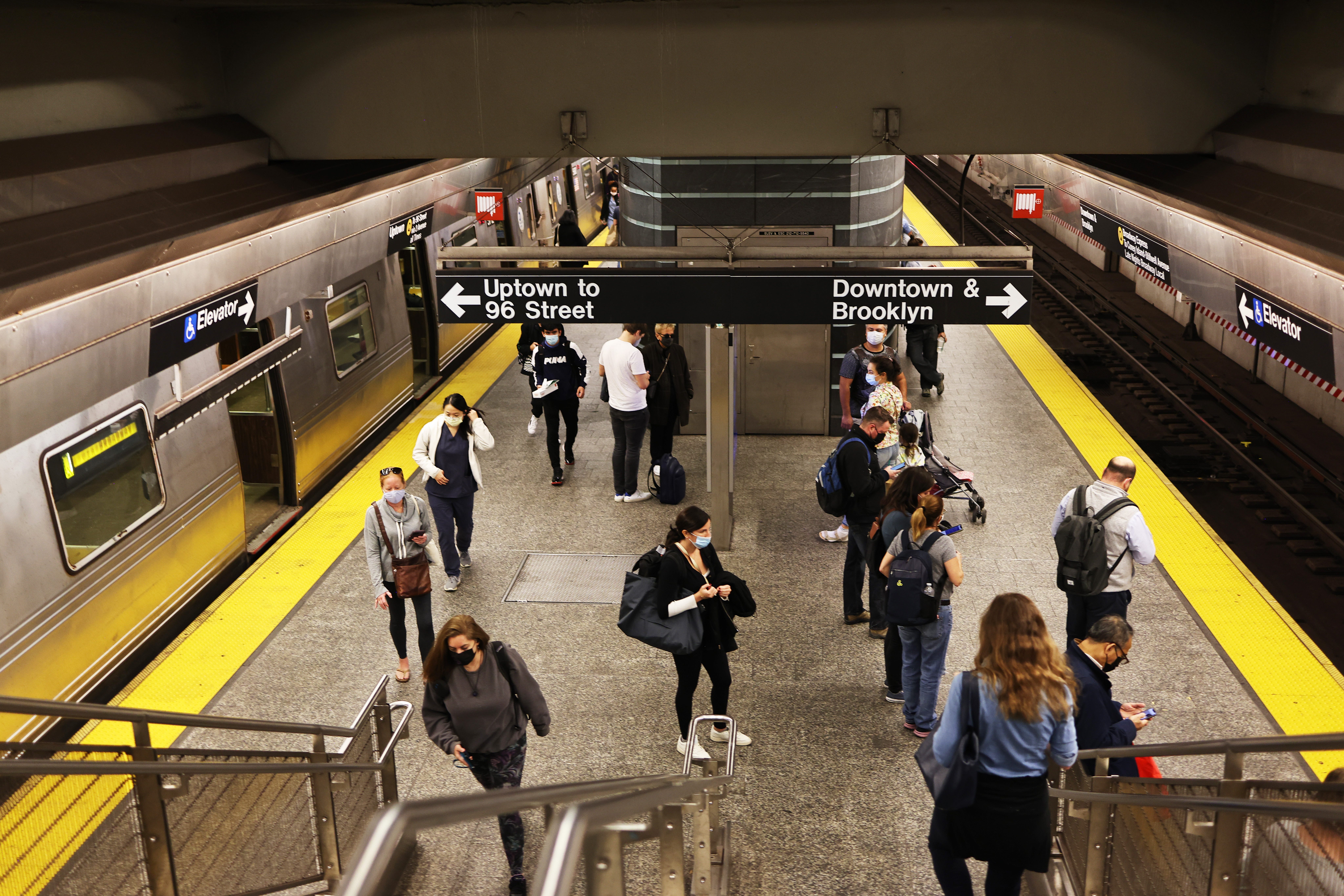On present day episode of the 5 Points podcast: One of the largest legislative victories of the Biden administration is the trillion greenback infrastructure monthly bill that he signed into regulation in November 2021. About 50 percent is predicted to pour into America’s broadband, utilities and transportation techniques over the coming months and several years. In communities throughout the nation, individuals are grappling with how they’ll use that revenue. Modern guest, Jonathan English, is a fellow in the Transportation and Land Use program of the NYU Marron Institute. He shares his understanding about what may perhaps be attainable for transit in The usa in the yrs to appear.
Strike perform on the player previously mentioned to listen to the podcast and adhere to together with the transcript underneath. This transcript was instantly generated, and then edited for clarity in its present-day sort. There may well be some discrepancies involving the audio and the textual content.
James Brown:
Hi there, and welcome to Five Points. I am James Brown. Go Charges.
Every single week we just take an thought or concept and go deep, and this week is about mass transit. Just one of the biggest legislative victories of the Biden administration is the trillion dollar infrastructure monthly bill that he signed into law in November 2021. About fifty percent of that bill is predicted to pour into America’s broadband, utilities, and transportation methods over the coming months and decades.
In communities across the region, leaders and citizens alike are grappling with how they will use this revenue to repair their transit techniques. Today’s guest has a several suggestions. Jonathan English is a fellow in the Transportation and Land Use Program of NYU’s Marron Institute. You can uncover him on Twitter at @EnglishRail. As his tackle hints at, his specialty is rail travel, and of course transit. Jonathan English, welcome to 5 Factors.
Jonathan English:
Properly hello there, and thank you incredibly considerably for possessing me.
James Brown:
Yeah, many thanks for currently being right here.
Jonathan English:
My pleasure.
James Brown:
You’ve got built a job in portion by analyzing American transit, in distinct New York’s process. What’s the charm?
Jonathan English:
Perfectly, it can be appealing, appropriate? It’s been close to for a good deal for a longer period than most locations. Since of that, it really is gone via various historic cycles. A subway that was built in 1995, it really is however mainly new and it hasn’t transformed substantially, but a subway like the a person in New York, it truly is been all around for effectively around a hundred yrs. Simply because of that, very first of all, so considerably has modified all around it. It has formed the town and how the town operates. In New York, there are all these stations in the subway, phone them ghost stations or sections of station, that ended up developed in anticipation of yet another subway that was heading to be built but hardly ever was.
From a scholarship standpoint, what really matters is that it tells us about in which we might be going, exactly where other places might be heading. And the struggles that the New York City subway had as it started off to get outdated, we are seeing those same struggles in metropolitan areas like Washington, in metropolitan areas like San Francisco, where by the system’s commencing to age and we have to imagine about it differently and rebuild it, in some cases nearly from the ground up.
And also the way that New York just stopped constructing, and that is been form of an American challenge to some extent. New York developed a person of the biggest subway systems in the earth in about 40 several years, which is actually rapid. And we believe that Chinese metropolitan areas establish speedy now. They do, but New York designed just as quickly in the ’10s and ’20s, into the ’30s, but then it just stopped and they crafted virtually practically nothing considering the fact that then, small small bits below and there. And knowledge why that occurred and possibly how that could be reversed is I believe actually important.
James Brown:
Nicely, I want to touch on a few of items that jump out at me from your reaction. You stated how subways form the city. I would guess that will come from the actuality that trains, and subways in specific, but trains general aren’t incredibly malleable. As soon as you put down the observe or create the tunnel, it’s tricky to transfer them.
Jonathan English:
That’s certainly ideal. It’s the permanence of rail. People today know that they can develop a setting up about it, and that rail’s going to be there for 50, a hundred many years. You would develop a subway out into farmland and condominium houses would just type of sprout up along them, as if you’re watering the floor. The way the country appears to be today, all the metropolitan areas across the US, is broadly a reflection of the transportation infrastructure that was dominant.
James Brown:
What is actually a poor transit program like?
Jonathan English:
Seriously what matters fundamentally for transit is the company. It will not subject how spectacular your bodily infrastructure is if the practice only arrives at the time an hour, or won’t run on weekends, or won’t run outdoors hurry hour, which is legitimate of lots of, a lot of, many transit units, particularly in the US. And that actually, really restrictions people’s life, but it also implies that no one just about requires transit if they have an option.
It locks people out of all forms of possibilities. You’ll have a enterprise in just one part of the town that is determined for personnel, and a man or woman who desperately desires a new job, but they cannot acquire the job due to the fact they can not get there by transit, and maybe they can’t afford to pay for a auto or cannot push a automobile for regardless of what rationale.
James Brown:
Comparing the costs of developing trains in an American city versus someplace like Paris, what kind of variation are we on the lookout at in terms of value?
Jonathan English:
The distinction can be as a lot as 10 instances more high priced to establish the very same issue in a US city as in a metropolis like Paris, which also has very sturdy rules.
James Brown:
Why are the fees of making trains overseas reduced than it is listed here?
Jonathan English:
That’s a pretty very good, but also a pretty challenging query, and some of my colleagues at the Marron Institute at NYU have just completed something identified as the Transit Expense Job. One of the factors that they have concluded is that it is really a sophisticated question. There is not a single single aspect.
Some of it is a absence of encounter. Some of it is that it usually takes a incredibly long time to get initiatives permitted in the US. 1 of the issues that’s intriguing is we are likely to create employing more mature engineering. This is a generalization, I know, but in other components of the world, what we are inclined to see designed most usually are somewhat brief trains that are computerized, so they run extremely frequently. Since when you consider about it, a coach that’s 3 automobiles long that operates every two minutes is going to have the similar ability as a coach 6 autos prolonged that operates every single 4 minutes.
The Second Avenue Subway was just crafted, but it really is crafted to hook into a line that was constructed in the 1920s, so it has big, lengthy trains that really don’t essentially run all that generally. When you go to Europe and you see, oh, appear at how extraordinary the trains are there, it’s not automatically that they’re paying additional than the United States is, it can be that they can build 10 periods as a lot for the identical quantity of income.
James Brown:
That is impressive. There have been several big educate wrecks lately. Obviously those wrecks weren’t passenger trains, but it does provide to thoughts train protection. What are some of the safety problems about trains?
Jonathan English:
So I’ll preface this by expressing that the prepare is mainly the safest way to travel. In the US, the procedures close to signaling are normally significantly much more handbook. They can actually be on a a lot less used line as uncomplicated as a man calling on the cell mobile phone to the dispatcher stating, “Alright, I’m shifting previous this location now. Make absolutely sure the monitor is very clear.” It does depart more room for human mistake, and there has been an escalating regulatory press for what is actually called positive practice handle on traces that have specifically passenger site visitors.
A central technique need to know the place the trains are and be equipped to quit them if they are heading someplace they should not. Those people devices are not nevertheless in place in most of the American rail community. Which is not to say that it truly is not a protected technique, and when you might be only functioning a number of trains a working day, as is the situation on many strains in the US, a procedure the place you just say, “Okay, I am on the line now,” is possibly just fine.
In sections of the US when you happen to be just carrying a sluggish train comprehensive of coal, the coal isn’t going to seriously care if the trip is bumpy, so from time to time the maintenance will not have to be as stringent, but as a outcome, in some cases the rails can break a minor little bit a lot more often, and then you can have a derailment. Most of the time, that doesn’t direct to any destructive repercussions genuinely, other than a bit of a mess to clean up up. But there are incidents where by there can be a toxic spill.
James Brown:
Any renowned previous terms?
Jonathan English:
Big photograph, concentration on provider. The history of transportation and infrastructure is super interesting, and I persuade people to dig into it a lot more. Almost everywhere you look around you, it is really mainly been formed by transportation, and the choices we make about transportation, infrastructure, and services, what we establish, is going to shape the metropolis of the long term.
James Brown:
I’d love to learn much more sometime down the street.
Jonathan English:
Thank you really significantly.
James Brown:
Jonathan English, many thanks for signing up for me.
Jonathan English:
My pleasure. Many thanks so a great deal for obtaining me.
James Brown:
Many thanks to Shannon Rae Environmentally friendly for enhancing this episode. For all of us at United states of america Right now, thanks for listening. I am James Brown, and as always, be very well.








